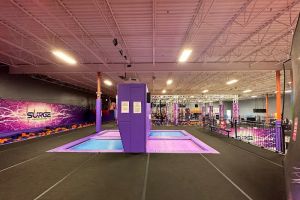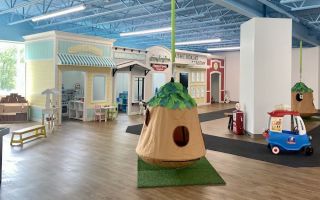Can You Go on Amusement Park Rides While Pregnant?
Pregnancy can be an exciting time, but it also comes with a few restrictions. If you’re a thrill-seeker and find yourself planning a trip to an amusement park, you might wonder, "Can you go on amusement park rides while pregnant?" Whether it's your first or third pregnancy, it's essential to know the safety concerns involved and how to navigate the amusement park experience during this time.

Surge Adventure Park
24 E 33rd St, Edmond, OK 73013, USA
1. Understanding the Risks of Amusement Park Rides During Pregnancy
Amusement parks are known for their thrilling roller coasters, dizzying spins, and high-speed rides. However, while these rides may be exhilarating, they also come with a certain amount of risk, especially during pregnancy. Understanding these risks is crucial before embarking on a fun-filled day at the park.
- G-force and sudden movements: High-speed rides and roller coasters subject your body to G-forces that can be intense, especially in the first and second trimesters. These forces may place undue stress on your body, which could increase the risk of complications such as miscarriage or early labor.
- Jerky motions: Rides that involve sudden stops, jerks, or sharp turns may also be uncomfortable or even harmful for a pregnant woman. These movements could potentially put stress on the abdomen and other areas of the body.
- Elevated heart rate and blood pressure: The excitement of the ride can cause your heart rate and blood pressure to rise. While this is usually not an issue for most, during pregnancy, it’s important to avoid overexertion, which could lead to fainting, dizziness, or other complications.
2. General Guidelines for Riding Amusement Park Rides While Pregnant
While amusement park rides can be risky during pregnancy, they don’t have to be entirely off-limits. There are several general guidelines to follow that can help you make safer decisions and still enjoy your trip to the park.
- Consult your doctor: Before planning your visit to an amusement park, it’s a good idea to check in with your healthcare provider. They can give you personalized advice based on your health and the progress of your pregnancy.
- Avoid high-intensity rides: It’s advisable to avoid intense roller coasters, water rides with sudden drops, or any rides that involve rapid twists or loops. These rides can be jarring on your body and may increase the risk of injury or complications during pregnancy.
- Listen to your body: Your body will let you know if a ride is too much. If you feel dizzy, lightheaded, or uncomfortable, it’s important to stop and rest. Don’t push yourself to keep riding if it’s not safe for you.
3. Safe Amusement Park Ride Options for Pregnant Women
There are plenty of rides at amusement parks that are safe for pregnant women, especially those that don’t involve high speeds or abrupt movements. If you’re planning a visit, these are some of the rides and attractions you can enjoy without putting yourself or your baby at risk.
- Gentle boat rides: Calm boat rides or river cruises that move at a slow pace are great options. These types of rides provide a relaxing experience while still allowing you to enjoy the atmosphere of the park.
- Ferris wheels: Ferris wheels are usually safe for pregnant women, as they provide a smooth, slow ride with no sudden movements. You can enjoy a bird’s eye view of the park from above without the risk of jolting motions.
- Carousels: A classic carousel ride is another safe and gentle option. With its steady, circular motion, it’s a peaceful way to enjoy the park while keeping both you and your baby comfortable.
- Walking tours and exhibits: Many amusement parks offer walking tours and exhibits that don’t require any rides at all. These can be a great way to explore the park without worrying about ride safety during pregnancy.
4. Can You Ride Roller Coasters While Pregnant?
One of the most common questions about pregnancy and amusement parks is whether you can go on roller coasters. While it might be tempting to hop on that high-speed, heart-racing coaster, it’s essential to know that most doctors recommend avoiding roller coasters during pregnancy.
- Why it’s risky: Roller coasters subject the body to rapid accelerations and decelerations, as well as sharp turns. These forces can lead to discomfort, dizziness, and even potential injury for both the mother and the unborn child.
- Potential complications: High-intensity rides like roller coasters have been associated with an increased risk of miscarriage or preterm labor, particularly during the early stages of pregnancy. Even later stages can be risky, especially if there are any underlying health concerns.
- Safety precautions: If you absolutely must ride a roller coaster, make sure to read all the safety guidelines and listen to the park’s recommendations. Some parks may even have specific rules for pregnant women, such as height restrictions or pregnancy warnings on certain rides.
5. How to Enjoy Your Amusement Park Visit While Pregnant
While you may need to skip the most thrilling rides, there are still plenty of ways to enjoy your day at the amusement park during pregnancy. Here are some tips to help you make the most of your visit:
- Stay hydrated: Pregnancy can make you more susceptible to dehydration, especially in hot weather. Make sure to drink plenty of water throughout the day to stay hydrated and prevent overheating.
- Take breaks: Don’t overdo it. Take frequent breaks to rest and recharge. Amusement parks can be overwhelming, and taking it easy will help ensure you stay comfortable.
- Use comfortable footwear: Walking around an amusement park can be tough on your feet, especially when you’re pregnant. Choose comfortable shoes that provide good support to prevent foot pain and swelling.
- Pick the right time: Try to visit the park during off-peak hours, such as weekdays or early mornings, to avoid the large crowds. This will make the experience more relaxing and enjoyable for you.
6. Listen to Your Body: When to Skip the Rides
Finally, remember that your body will give you signs if a ride is not suitable. If you experience dizziness, nausea, or discomfort, it’s important to stop and rest. Your comfort and safety are the top priority, so don’t feel pressured to take rides that don’t feel right for you. There’s plenty to enjoy at amusement parks, even if it doesn’t involve the most intense rides.



































